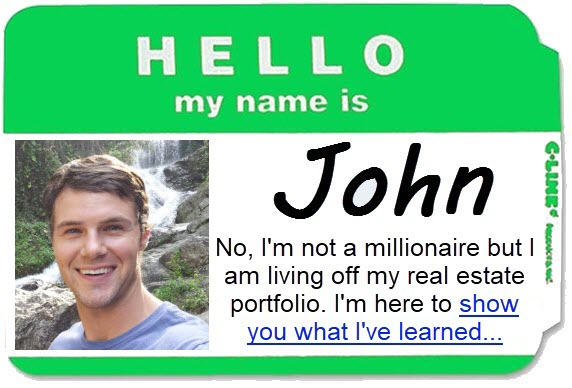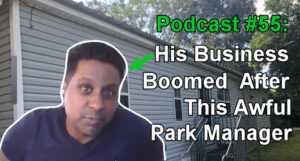Welcome back,
In this article my good friend Frank Rolfe writes about negotiating with mobile home parks you are aiming to purchase. This is a slightly change as we usually discuss simply investing in individual mobile homes, both on private land and inside park. There is obviously big money to be made investing in mobile home parks and this is often where many mobile home investor work their way to. .
Many people are in such a rush to buy a manufactured home park that they forego proper due diligence and launch themselves into a nightmare that it’s hard to escape from. NEVER buy a manufactured home park without following our 30 Days of Diligence format, and obtaining the necessary third party reports, such as the Phase I Environmental Study. While there are some great parks for sale out there, there are an equal number of stinkers that you should never get involved in. So never buy a park that you don’t know inside out and that has passed every test from the Test Ad to the Phase I.
How to negotiate a HP price:
There are many books on the market regarding negotiation. One thing they almost all have in common is that they’re wrong about the process – certainly on a big ticket item like a manufactured home park. Although you might be able to get some tips on buying or selling a used car from these materials, there’s definitely a better way to negotiate a manufactured home park..
This is not Hollywood:
Many negotiation books want you to believe that negotiation is a sales pitch – something that you can rehearse and works on everything from selling pencils to skyscrapers. They try and convince you that if you fail at negotiating what you want, it’s all your fault because you didn’t have your speech rehearsed enough, or you forgot the special gimmick that seals the deal.
The truth is that negotiation is not based on some canned sales pitch. Real negotiation – the kind that leads to contracts being signed – is nothing more than properly laying out what you want out of the deal, and listening and trying to provide the seller with what they want, as well. It’s a communication process, not carnival hucksterism..
Win/win negotiating is always best:
What is win/win negotiating? It’s the process of both buyer and seller walking away from the transaction with a happy, satisfied feeling that they achieved in obtaining their goals. It is not the type of negotiation in which one party wins over the other, either through taking advantage of the other party’s weakness in timing or other issues. That type of negotiating is often called “Russian Negotiation”, in which there is a clear winner and clear loser when the deal is done. The problem with Russian Negotiation is that it rarely leads to a deal being struck unless one party is desperate, and can often lead to further problems such as litigation since often the losing party harbors a grudge or attempts to get back at the one who has “wronged” them.
Win/win negotiation, on the other hand, is 100% based on truth and mutual respect. A win/win deal leaves the buyer and seller with a lasting bond of friendship and esteem. And – most importantly of all – only win/win negotiating has a good chance of getting a successful acquisition put together..
Act like a consultant:
Many people blow negotiations by trying to be aloof and distant – kind of a “poker face” appearance coupled with what they think are skills from a Donald Trump episode. While those may work great on-camera, nobody negotiates like that in real life. Why? Because those types of stand-off situations only work when one party is desperate to sell, or they would walk away. The moms & pops that you negotiate with do not need to sell their park to you. It’s income producing and they have lots of offers. So the whole concept of “forcing” them into signing up is ludicrous.
The more effective approach – and the one that we use – is to act like their employee, instructing them on how much they can get in today’s market, and why you are the best buyer for them. Sellers react very positively to someone who explains the realities of values and differentiates themselves from the pack. In so doing, you can also educate them on the benefits of seller carry..
Tell the truth:
We never make up problems with a park, just to get a lower price. Why? Because we have seen too many situations in which the buyer blows the deal because they got too greedy. We try to make our best offer and stick with it – not try to throw out low-ball prices looking for a sucker. If a deal works at $1 million, then we might try to offer $900,000 and see if they’ll counter. We’re not going to offer $500,000 and see if we can con them into that price. We also don’t make up ridiculous rationalizations like “the roads need $80,000 of repair” when they actually only need $200 of cold-patch. Over the years, we’ve noticed that people who try to take advantage only end up with lousy, week portfolios because the sellers with good parks don’t give them the time of day, and they are relegated to the sellers who have no other option because their park is so poor..
Be prepared to walk away:
Since you are approaching this as a win/win deal, that means that you have to make money, too. If the seller won’t sign up at the price that works, then thank them for their time and quit. You would be amazed at how many sellers come back to us a while later and agree to our earlier offer that they refused. When you are willing to quit, it sends a firm message to the seller that the price is the top of the market. Don’t ever get so anxious to buy a park that you are willing to lose money just to get the deal done..
In conclusion negotiating is an art. But it’s not some surreal, impressionistic type of art. It’s more like a Norman Rockwell painting. People want to be treated fairly and want an up-front “solutions-driven” process. With a win/win approach, there is always a happy ending.
Love what you do daily,
John Fedro
support@mobilehomeinvesting.net
Related video:












2 Responses
Thank you for passing this article along. I greatly respect Frank and you both. – Rach
Great article with good points for negotiating on real estate purchases of any kind.
I have found personally that many times a deal was saved because I made the effort to go and speak directly to the sellers rather than communicate through a real estate agent. Often going through a third party makes the transaction very impersonal and it is very easy for deals to fall through.
As you mentioned though, one of the most critical points is having your line in the sand before you start negotiating.
Nathan